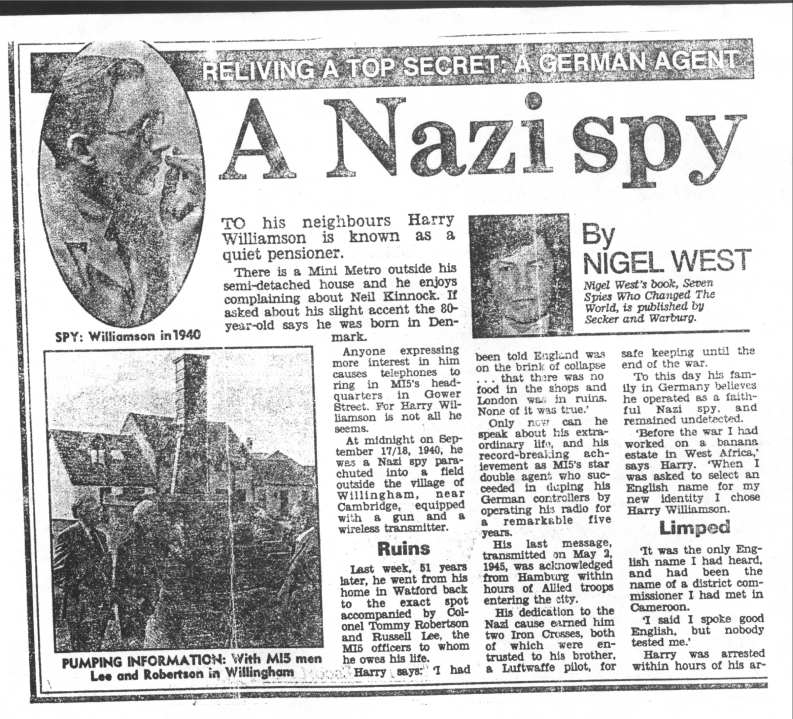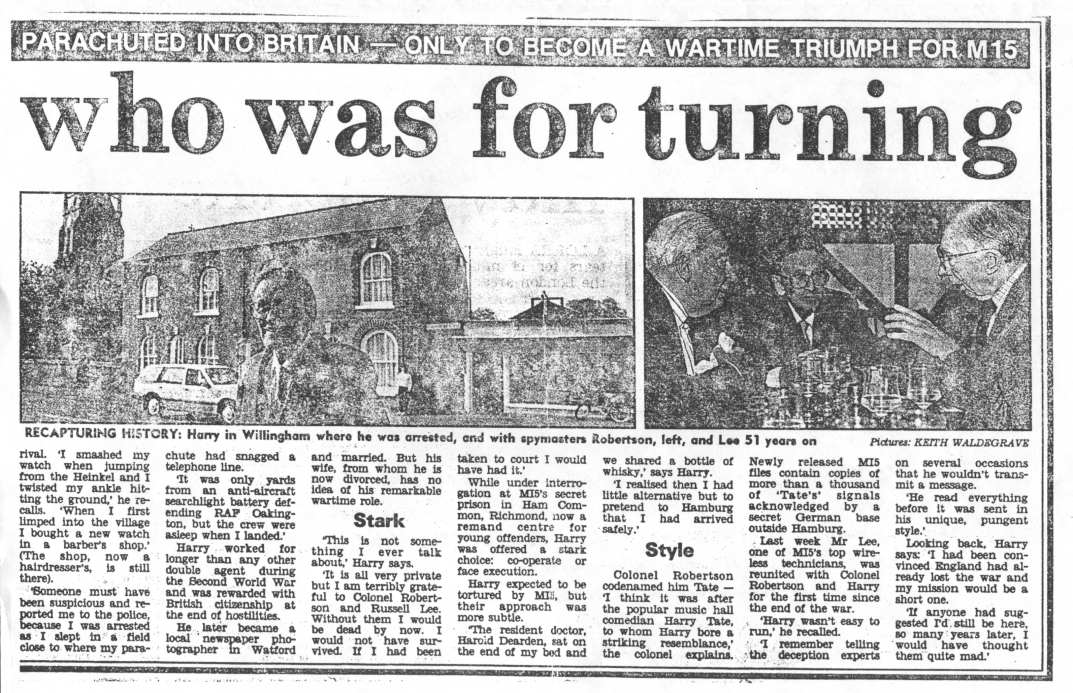Background
HARRY WILLIAMSON, parachuted into Britain in 1940 as Wulf Schmidt to, spy for Germany in the run up to the expected invasion. He was rapidly rumbled and spared the noose after being “turned” by MI5. For the next five years he fed false information to his controllers in Hamburg. The Danish-born double agent so impressed the Nazi authorities that he was made a naturalised German by radio and awarded the Iron Cross First and Second Class in absentia.
To his British spy chiefs Schmidt was known simply as “Tate” – he was thought to resemble the music-ball comic, Harry Tate. His value to Britain as a master deceiver was incalculable. He set false scents and traps for U-boats and misled the enemy to expect heavy D-Day assault across the Straits of Dover on the Pas de Calais.
Towards the end of the war in Europe the introduction of Schnorkel U-boats enabled the enemy to recharge batteries. while submerged. There were insufficient mines to counter this development but “Tate” convinced the German navy that minefields proliferated where in fact they did not exist or were negligible. During the summer of 1943 he worked as a cover on a farm at Wye, a location which suggested he was well placed to observe a cross channel raid. This served the purpose, throughout 1943, of making Hitler jumpy in the West and relieving pressure on the Russians fighting on the Eastern front. The next year he operated similarly before D-Day, embellishing his reports with news of fictitious plans for additional landings, in Scandinavia and on the French Atlantic coast. After U-Day “Tate” was set a new task of deceiving the enemy about of the accuracy of their V-1 doodle bug flying bombs.
Wulf Schmidt was born in 1911 at Abenra, South Jutland, an area which had been German-occupied since the Prussian war of 1854 and returned to Denmark in 1919. He served briefly in the Danish army before accompanying a consignment of cattle to Argentina. He made a second trip and then settled in the Cameroons to grow bananas. He did not return to Germany until just after the outbreak of the Second World War. He was recruited as an agent and operated in Copenhagen before volunteering to parachute into England. His English was good if slightly guttural; he was confident that invasion forces would follow him within weeks.
On the night of Sept 19th 1940 Captain Karl Gartenfeld of the Luftwaffe took off from Brussels in a specially black painted Heinckel 111 bomber and a despatcher pushed out Schmidt – armed with a new identity as Harry Williamson – over the RAF station at Oakington. He was doomed from the Outset, having been betrayed by a Gustav Caroli, a Swede who preceded him and had been caught. It fell to the Home Guard in the village of Willingham, near Cambridge, to bring him in.
He was ill prepared to resist interrogation. He was obviously very confused both by our duodecimal currency system and by the ration coupons with which he had been issued. Expecting torture, he was astonished by his courteous reception and generous offers of whisky.
On Oct 16th 1940, after recovering his buried radio, be called up Hamburg and said he was living near Barnet; in fact he was at Radlett with his MI5 minder. For the next two years the Germans plied him with questions. They seemed obsessed with the price and availability of food and sundry other items. They were especially anxious about the “many, underground food-stores” in England.
To gain the trust of his supposed controllers “Tate” fed back some fairly accurate information. But on occasions neither he nor his minders could resist a touch of cheek: on Sept 21 1944 he recorded, “On the occasion of this, my 1000th message, I beg you to convey to our Fuhrer my humble greetings and ardent wishes for a speedy victorious termination of the war.”
After the war he remained in Britain and worked as a photographer for the Watford Observer and later as an export manager. A caged bird-fancier, he judged competitions in his spare time. For years he lived quietly keeping his story to himself until, curiously, publicity over an unpaid poll tax bill led to revelations about his colourful past. His marriage, to an English woman after the war, was dissolved. He had a daughter.
See also: Book available from Amazon.com



